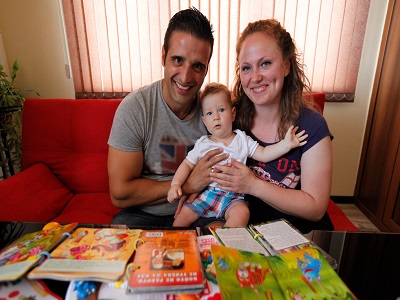Cover image: © UNICEF/UN039273/Popov
Children learn more quickly when they have a positive attachment to their mothers and fathers. Children need their parents to develop their full potential.
Findings of research in neuroscience and parenting, provide evidence on the lifelong benefits of investing in the earliest years. At the same time, research findings have demonstrated that home visiting programs can increase parental well-being and parenting efficacy, as well as child outcomes.
The courses contained in the resources for home visitors were designed to upgrade and enhance the role of home visitors and to provide them with essential knowledge and tools in order to support and engage the families of young children. Well-trained, respectful, sensitive and family centred home visitors can build on this motivation and contribute to strengthening parenting competencies family resilience and children well-being.
The modules were prepared through a consultative process involving international and regional experts, national trainers and home visiting professionals. Because parenting is mediated by cultural values and beliefs, these generic courses can be adapted to specific country contexts and enriched with local examples and tools.
The courses encourage home visitors to take a strengths-based approach, to promote robust caregiver-child relationships and contribute to reducing risk by supporting and referring families to other services as needed. We trust that training based on these courses will enable home visitors to develop positive, respectful and sensitive relationships with families; help them to assess regularly the strengths and needs of individual children and their caregivers; and assist them to support and empower parents for informed actions and decisions with regard to their young children’s health, well-being and development.
Learning objectives
This module will provide you with the basic theory on attachment and practice exercises to help you support secure parent-child attachments during your home visits or with your child.
By the end of this module, you will be able to:
- Explain the critical role of affection and a secure parent-child attachments for health, development and overall well-being of the child and the family
- Identify patterns of secure or insecure attachment
- Be aware that patterns of attachment can be transmitted across generations, and
- Practice some skills that promote secure and healthy parent-child attachment during every home visit.
Methodology
This course is composed of five sections, including various examples, activities and assessments. This e-learning activity can be taken as a stand-alone course or as part of the Home Visitors resources modules.
Audience
- This course is intended for home visitors and home nurses to learn valuable information about early childhood development, so they can educate parents and caretakers on these techniques.
- This course is also open to parents, caregivers and UNICEF staff and UNICEF partners.
Length
It will take you about 1.5 hours to complete this self-paced course.
Structure
This course is composed of five sections:
- Introduction
- The neuroscience of affect and parent-child attachment
- Patterns of parent-child attachment
- Trans-generational patterns of attachment
- Falling in love, even during hard times
Contact details
For content queries, questions and suggestions, please contact Silvia Sanchez (sasanchez@unicef.org) or Aleksandra Jovic (ajovic@unicef.org)
For technical issues, please contact the Agora team (agora@unicef.org)
